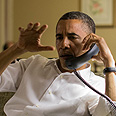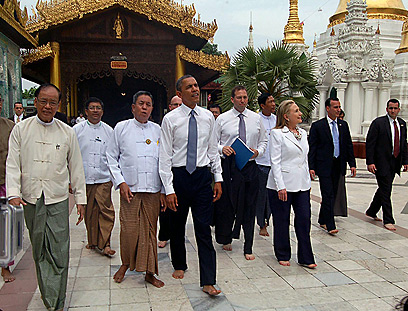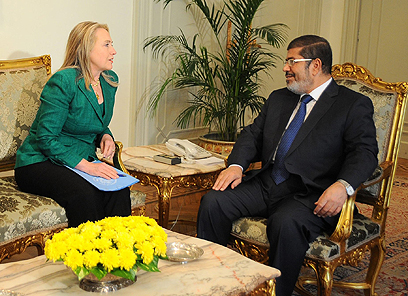
Remote control: How Obama orchestrated ceasefire
Little was heard from US president during military confrontation between Israel and Hamas, but behind the scenes, while visiting Burma and Cambodia, he was working overtime to pressure Netanyahu into agreeing to truce
WASHINGTON - Two months back: Barak Obama is dodging Benjamin Netanyahu and Mohammed Morsi at the UN General Assembly in New York. The president made tremendous efforts not to meet with any foreign leaders so as to ensure he would not be required to have his picture taken with either the Israeli prime minister or the egyptian president- a political act of a pre-election nominee.
Related Stories
- Netanyahu: Give ceasefire a chance
- US: We want same thing as Israel wants
- Obama reiterates support for Israel's right to defend itself
This week, things looked very different. Israel received public support during the ongoing rocket salvos fired at its citizens and Egypt was crowned as the key actor in th ceasefire negotiations for ending Operation Pillars of Defense.
Obama's body was in Asia but his mind was in the Mideast
Obama was a one week voyage to Asia which culminated with a historical visit to Cambodia and Burma. Though his body was in Asia, the leader of the free world's mind was well in the Mideast.

Obama and Clinton in Burma (Photo: EPA)

Obama in Cambodia, but his mind is in the Mideast (Photo: AFP)
Throughout his trip in South East Asia he was constantly on the phone with both Morsi and Netanyahu, before and after his meetings with the leaders of China and Japan. The president even made time to speak with both leaders during a dinner held as part of a summit of East Asian leaders.
His goal - creating the conditions needed for a ceasefire. Publically he praised Morsi and Netanyahu, and behind the scenes he was pressuring them to bring the conflict between Israel and Hamas to an end.
Egyptian incentive, American sentiment
Morsi, for those who don’t recall, needs money- and lots of it.
The Egyptian economy is on the brink of collapse and the newly elected president is no longer a member of the underground opposition but rather a president who now has 85 million mouths to feed. Obama can grant him financial aid and help him receive additional funds from the IMF.
Obama and other high ranking American officials, such as Hillary Clinton and Leon Panetta, have warned their Egyptian counterparts that Egypt is at risk of losing its aid from Congress, which is beginning to lose patience with Egypt.

Clinton and Morsi, before ceasefire. (Photo: AP)
Egyptian Ambassador to Washington Mohamed Tawfik, visited Capitol Hill several times this week in an attempt to convince congressmen on that Egypt is a serious and responsible actor.
On Wednesday, Tawfik met with Jewish Democratic Congressman Brad Sherman. The two discussed the current conflict in Gaza as will as US-Egyptian security and economical relations.
On Sunday, during an interview for NBC's "Meet the Press," Republican Sen. Lindsey Graham looked straight into the camera, pointed a finger and said: "Egypt, watch what you do and how you do it. You’re teetering with the Congress on having your aid cut off if you keep inciting violence between the Israelis and the Palestinians.”
Helping Morsi help himself
Hamas was planning on a victory shot, but this was not what they were praying for.
The Islamist movement controlling Gaza thought that maybe, just maybe, it would be able to draw the Muslim Brotherhood, together with President Morsi, into the fighting ring against Israel.
However, things developed differently. Morsi did indeed return his Ambassador from Israel in protest against the assault on Gaza, and issued an aggressive anti-Israeli statement, but throughout the fighting, Egypt's side of the border remained quiet.
Moreover, Hamas suddenly became a threat to the Muslim Brotherhood government and Egypt, leading them to react accordingly.
America's ceasefire, Obama's real vicotry
The Americans are of course content with the ceasefire, as well as with its aftermath, as they know it was brokered by Egypt's first democratically-elected president.
Obama made a number of mistakes during his first term, including some that damaged the Israeli-Palastinain peace process, and also presented himself as the president who threw deposed Egyptian president Hosni Mubarak under the wheels of the revolution.
After the outbreak of the current round of fighting, Obama threw the entirety of his support behind Israel. He publically stated that it is Israel's right to defend its residents. In addition he refused to publically object to an Israeli ground operation in Gaza, even though behind the scenes he did everything in his power to prevent it.
The American president realizes he has no choice but to work with Morsi. The US administration identified the risks but also the great opportunities of restoring US influence to Egypt. In White House reports regarding a phone call between Morsi and Obama, Obama is reported to praised Morsi's part in the ceasefire as well as reiterating the importance of close cooperation between the two on issues of regional security.
The ceasefire remains fragile, but the process seems to have created a very positive basis for future cooperation between the US and the Muslim Brotherhood administrations, returning a hope for stability to the region.
Obama promised Netanyahu to assist in preventing arms and munitions smuggling into the Strip as well as restating his commitment to help seek funding for an additional Iron Dome missile defense battery, as well as additional supplementary systems required for securing Israel's safety.
There is no doubt that President Obama has delivered the goods Israel needs for protection against ballistic as well as short range rockets, specifically in light of Iron Dome's success.
However, the real test for American and Egyptian relations lies in creating an apparatus for preventing rockets from reaching the Gaza Strip.
Follow Ynetnews on Facebook and Twitter
Receive Ynetnews updates directly to your desktop










